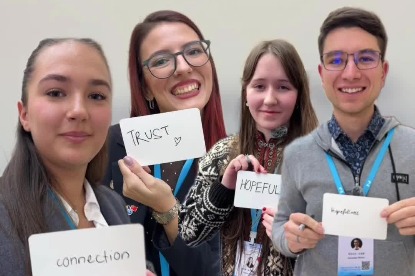Jiangsu's hearing-impaired baristas brew a new future

In a government service hall in Huai'an in China's Jiangsu province a quiet revolution is brewing.
Amid the usual bureaucratic hum, a different sound fills the air: the gentle whir of coffee grinders and the soft hiss of steam.
This is the "Silent Coffee" shop, a pioneering project where baristas communicate through warm smiles and sign language. It's more than just a cafe, it's a beacon of opportunity for the city's deaf and hearing-impaired community, creating career paths that bolster their public visibility.
The model is designed for seamless interaction. Customers order via a QR code and specify their preferences on a voice-recognition tablet. The concept has proved wildly popular, making the shop a bustling hub. Delivery drivers in their iconic uniforms — a rare sight in a government building — are now constant visitors, ferrying takeout orders across the city.
The broader disability assistance space, which opened in December 2023, showcases work by disabled craftspeople and offers wheelchair rentals. Yet, it is the Silent Coffee shop — launched a mere month later — that has become the space's vibrant, beating heart.
For barista Wang Jiali, this place has been transformative. The 39-year-old, who has severe hearing impairment and uses a cochlear implant, stumbled upon the shop while visiting the hall two years ago. With no prior experience, she was trained from scratch, learning to master the entire menu.
"We have to know how to make all the coffees, not just one or two," she explained.
Unlike her previous isolating office job, this role requires daily interaction. While most are smooth, some encounters test her patience and courage. She recalls a busy moment when a customer grew angry, unable to get her attention over the noise. After Wang Jiali explained the shop's concept, the frustration melted into understanding.
"It has exercised my courage," she said. "My eloquence has improved as well."
Her evolution from a silent world to confidently engaging with the public captures the program's deepest success and has sparked replication. In July, a second government-assisted space with a Silent Coffee shop opened in a similar service hall in Huai'an's Huaiyin district.
Local government figures showed that the program's systematic training has already empowered over 20 people with disabilities, with eight becoming certified baristas now working across the two locations.
Behind these shops is owner Wang Xian, who was inspired to leave her corporate sales career after learning of the local Disabled Persons' Federation's plan. Her motivation is deeply personal, rooted in the experiences of her hearing-impaired aunt and uncle, who spent their lives vending tofu on the street.
For Wang, the real success is measured in moments of human connection. She watches the gentle interactions between customers and staff and sees the delivery apps flooded with warm encouragement. She initially doubted her team could master the dozens of intricate coffee recipes, but their incredible commitment proved her wrong.
"It's not easy for our hearing-impaired staff to master these skills," she acknowledged. "But they proved me wrong."
Wang and local officials praise the strategic placement of the cafes inside government buildings as an innovative move. By situating them in a hub frequented by business owners and professionals, the project visibly integrates persons with disabilities into the professional world, demonstrating their capabilities directly to potential employers.
- Jiangsu's hearing-impaired baristas brew a new future
- Influencers get hands-on in Hangzhou's rural museums
- Wuxi gathers global leaders to shape 15th Five-Year Plan vision
- French couple dedicated to sharing story of 'Dunhuang Guardian'
- Military doctor Li Huiling honored for her tropical medicine work
- Hengshan Mountain in Hunan shimmers with first rime of winter





































